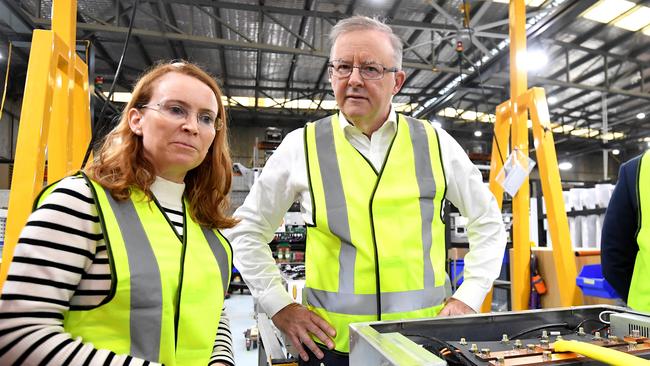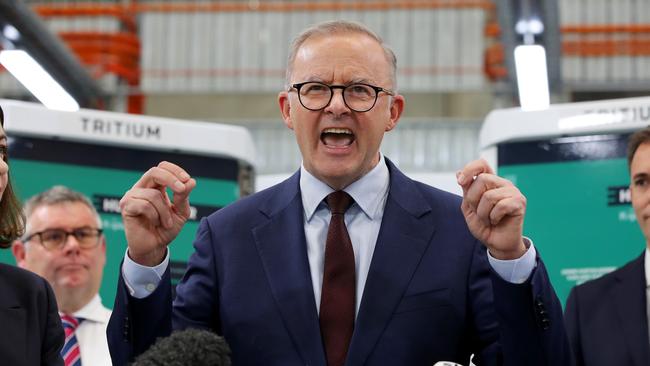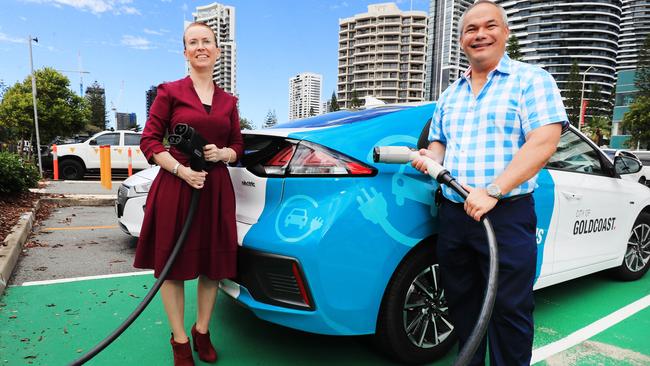Tritium collapse another blow for Australian manufacturing
The collapse of fast-charger maker Tritium puts 180 local jobs at risk, exactly two years after Anthony Albanese stood on the factory floor and declared the high-tech roles “secure”.

Fast-charger maker Tritium has become the second significant local manufacturer to collapse this week, at the same time Prime Minister Anthony Albanese has been spruiking his policy to encourage investment in the sector.
Brisbane-based, Nasdaq-listed Tritium has appointed receivers with creditors owed more than $150m, just days after plastics manufacturer Qenos called in voluntary administrators.
Mr Albanese unveiled the Future Made in Australia Act just over a week ago, saying it would co-ordinate a package of government initiatives to boost investment. “Our Government is investing in manufacturing to make more things here,” he said in his speech to the Queensland Media Club on April 11.
But for Tritium, once worth an estimated $2bn when it listed on the Nasdaq in 2022, all the talk seems to have come too late.
KPMG was appointed voluntary administrators on Friday and McGrathNicol named receivers and managers of the manufacturer which had accumulated heavy losses in recent years amid rising competition.
Despite its difficulties the company had hosted repeat visits from Mr Albanese over recent years to spruik its credentials as a poster child for advanced manufacturing in Australia.
“These jobs are secure jobs. They’ll grow,” Mr Albanese, as leader of the Opposition, told journalists when he visited the Tritium factory in Murarrie exactly two years ago on April 19, 2022. “They’re looking at expansion here in Australia. This is an example of the opportunity that is there from embracing the future.”
A year earlier he had hailed the company as a “world leader”.
“It shows how good Australia can be if we commercialise our science, if we commercialise the capacity of our innovation,” he said.
But Tritium, which designs and manufactures fast chargers for electric vehicles, last year announced it was closing its Brisbane factory as part of a cost-cutting restructure.
The business had attracted investments from Queensland-based richlisters Brian Flannery and Trevor St Baker. Mr St Baker’s private company Sunset Power provided a $US20m ($31m) loan in December 2022 that was drawn down in full the same month. He declined to comment on Friday.
McGrathNicol partner Shaun Fraser said the immediate focus of receivers was to stabilise the company’s operations and work closely with Tritium’s employees, customers and suppliers “to secure the best possible outcome for all parties.”

It was earlier reported that Taiwan-based Lite-On was among possible new investors in the business. “A sale process for Tritium’s business and assets was underway prior to our appointment and we will be re-engaging as a matter of urgency with interested parties and the broader market to seek to find long-term capital,” Mr Fraser said.
He said Tritium had operated in a difficult market with uncertainty about how the global roll out of EV chargers was going to proceed. “Clearly the Nasdaq listing did not work out as well as planned and the company could not access the capital they had hoped.”
Mr Fraser said it hoped to retain as many of the company’s 450 employees, including 180 based in Brisbane, while the business sought new investors.
“The company clearly has some valuable assets and people and we would be aiming to retain as much of that as possible,” said Mr Fraser.
Tritium, founded in 2001 by engineers David Finn, James Kennedy and Paul Sernia, had won deals with BP and Shell, among others, to supply fast-chargers across the world.
But it has conceded its operating model had risks in a fast-changing market.
Tritium focused on developing public DC fast-charging stations as well as charging stations for government and corporate fleets.
Chief executive Jane Hunter in 2022 had boasted Tritium was set to expand its global manufacturing capacity and was poised to overtake engineering giant ABB as the world’s biggest EV charger maker. A Tennessee factory in the US was expected to house up to six production lines for Tritium’s fast chargers.
However, many of its competitors offered cheaper home-based AC charging equipment. Another competitive threat was EV giant Tesla which has a large public DC charging network in the US using its North American Charging Standard (NACS).
Tritium posted a loss of $US120.3m last financial year with net liabilities of $US134m, sparking a warning from auditor PwC that there was significant doubt about the company’s ability to continue as a going concern.





To join the conversation, please log in. Don't have an account? Register
Join the conversation, you are commenting as Logout